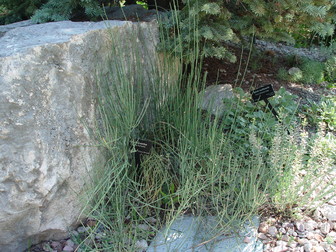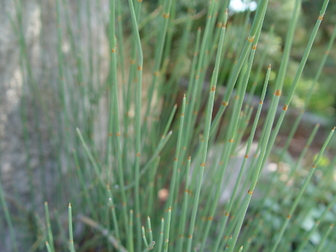Back to Tour: Medicinal Plants Tour
|
Ephedra sinica Chinese Ephedra; Chinese Joint Fir; Ma-huang |
Denver Botanic Gardens
Gardens Navigator 
|
|
Accession Number: 990547*1 Map | Images | |
| More about Ephedra sinica | |
| TOUR DETAILS |
Medicinal uses: Chemically, ephedra contains the alkaloids ephedrine and pseudo-ephedrine (which give that adrenaline rush). Like coffee, an overconsumption of ephedra can lead to nervousness, tension and insomnia, and high blood pressure, and reduced appetite. Researchers have found that overconsuming ephedra can also cause a reduction in libido. When ingested, ephedra dilates the bronchioles in the lungs, which makes it an effective treatment for diabetes, asthma, any heart ailment and syphilis. Ephedra iis commonly found in natural weight-loss and energy formulas, as the stimulation is supposed to burn fats and increase metabolism. Those taking the common form of ephedra, ephedrine, must be careful, as at least 15 people have died from overdosing on ephedrine pills. Ephedra is also known to cause increase in sweating, as well as being an effective diuretic. Mythology/Folklore: According to legend, the body guards of Genghis Khan, threatened with beheading if they fell asleep while on sentry duty, used a tea containing ephedra to stay alert. One of the other names for Ephedra is “Mormon tea” referring to the times when Mormon pioneers, moving across the U.S., made tea from the stems of this plant. In the Old West, ephedra was reputed to be a cure for both syphilis and gonorrhea. Because of this, it was often a popular brothel beverage, earning the nickname “whorehouse tea.” Mankind’s relationship with ephedra goes back even farther, when explorers found ephedra buried in a Middle Eastern Neolithic grave, indicating it was used as a medicine over 60,000 years ago! Medicinal recipe: Ephedra Tea (a coffee substitute) ¼ to 1 tsp. dried ephedra (stems), 8 ounces boiling water Pour water over the tea and allow to steep for 5- 10 minutes. Many find the taste unpleasant. Sweetening with honey or sugar is an option. Some recipes recommend adding milk to moderate the taste. Culture: (From Mike Kintgen, staff horticulturalist) The ephedra is robust and doesn’t need much attention. Ephedra seed is viable for quite some time. It thrives in ordinary loamy soil and does very well in a loose rocky soil with full sun and a little water. It is most often propagated by division of the clumps in spring, and seeds sown in a light sandy soil in early spring |
| LOCATION GROUP | Rock Alpine Garden; Rock Alpine Garden, Scree Mound |
| FAMILY NAME | Joint-Fir Family |
| FAMILY | Ephedraceae |
| ACCESSION DATE |
March 24, 1999 (When this plant was acquired and registered in the database) |
| FLOWER COLOR | yellow |
| FLOWER COLOR NOTE | yellow-green |
| USDA HZ | 3 (Coldest Zone Where Hardy) |
| HABIT | Sub-Shrub |
Location Map for 990547*1 Ephedra sinica
Map Help
Images © Denver Botanic Gardens
 990547*1 Ephedra sinica |
 990547*1 Ephedra sinica |
| ^Top of Page |

© Denver Botanic Gardens, 1007 York Street, Denver, CO 80206
Photography © Denver Botanic Gardens

Powered by







 E-mail
E-mail